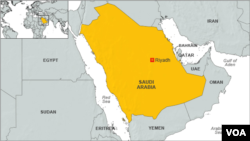A small fire erupted on a gas pipeline in eastern Saudi Arabia on Tuesday after assailants shot at a security patrol, security and oil industry sources said, in an incident that may heighten concern about the vulnerability of Saudi energy infrastructure.
The pipeline has been repaired and there was no impact on oil or gas production, the sources said.
But the incident marks the first confirmed attack on physical energy infrastructure in the world's top oil exporter since 2006, when Saudi security forces foiled an attack by al-Qaida militants on the giant Abqaiq processing plant.
The Saudi security source said the fire started after a stray bullet hit the pipeline when shots were fired at security forces patrolling the oil-rich Eastern Province.
The news had almost no immediate impact on the oil market. International benchmark Brent crude oil was down $1.11 at $101.68 a barrel at 1144 GMT, pressured by worries about slowing demand growth in China and Europe, a strong U.S. dollar and ample supplies.
“It was a gas pipeline, it was repaired and there was no effect on anything,” the industry source said.
A resident in the Eastern district of Qatif said the incident had taken place close to a checkpoint at the entrance to the village of Awamiya, but that it had caused no damage to homes or other property.
“It wasn't very big or loud, but people in Awamiya and the neighboring village of Safwa heard it,” he said.
Shi'ite unrest
Awamiya in Qatif district has been the location of Saudi Arabia's most persistent unrest, with protests by members of the Sunni kingdom's Shi'ite minority in 2011 continuing until last year, coupled with occasional shooting and fire-bomb attacks on police.
There have been no confirmed attempts by Shi'ite activists to target Saudi Arabia's energy facilities. State oil firm Saudi Aramco is a major employer of Shi'ites in both Qatif and the sect's other main population center in Eastern Province, al-Ahsa.
However, there was speculation in late 2012 that a cyber attack on Aramco, which forced the oil company to replace thousands of computers, had been planned by local Shi'ite activists. Officials later said the attack had been planned abroad.
An August 2008 U.S. assessment, revealed in a Riyadh embassy cable released by WikiLeaks, said Saudi facilities were “highly vulnerable” and that any disruption would likely have a “devastating impact on the U.S. national economy and the global economy as a whole”.
Discrimination alleged
Saudi Shi'ites complain that they face systematic discrimination from the country's Sunni-ruled government. They account for 10 to 20 percent of the population and live mostly in Eastern Province, where the biggest oil and gas fields are located.
Shi'ites say their areas receive less investment and that they are restricted in matters of public worship and mosque building, are not appointed to important jobs in local government and are subjected to slurs by senior Sunni clerics.
The government said there is no discrimination.
Protests in 2011 calling for more rights for Shi'ites and democracy were quickly quashed by the authorities, but sporadic protests continued and more than 20 people were killed.
The authorities have blamed some of the unrest on an unidentified foreign power, widely understood to be Iran, and last year detained some Shi'ites accused of joining an Iranian spy ring. Local Shi'ite activists deny being in touch with Tehran.









